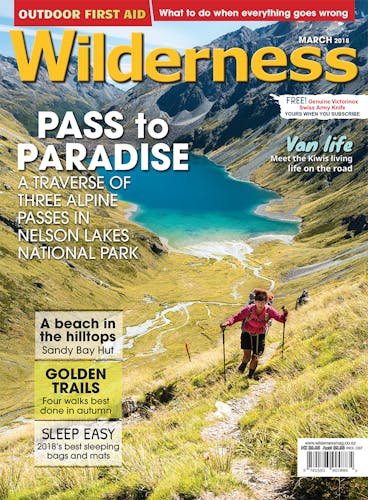The majority of Auckland tramping clubs have decided to stay out of the Waitakere Ranges after local iwi Te Kawerau a Maki placed a rahui on the forest to prevent the spread of kauri dieback disease.
Last year, an Auckland Council report found the rate of dieback in the ranges had doubled in the past five years – 19 per cent of kauri trees in the forest are now infected. The council has since closed 42 high risk tracks, however Te Kawerau a Maki has asked people to stay out of the entire forest.
Six out of eight clubs Wilderness spoke to said they were no longer holding trips in the Waitakere Ranges, while two clubs were continuing to tramp there.
Auckland University Tramping Club captain Sophie Jenkins said the club was in a difficult position, as they had a hut in the ranges, but they had decided to respect the rahui.
“A lot of our club trips are in the ranges, but if we want to keep tramping, we need to protect the environment,” Jenkins said.
North Shore Tramping Club acting president John Lamb said the club was respecting the rahui, but would review its policy later this year. He said some members of other clubs that weren’t respecting the rahui had decided to come on North Shore club trips instead.
Howick Tramping Club president Philip Scothern said the club had also decided to stay out of the ranges.
“People need to realise it’s no joke,” he said.
Scothern said the club now carries its own cleaning equipment on tramps through kauri forest, as often the council equipment wasn’t maintained.
Pukekohe Tramping Club president Dee Keys said the club had sought advice from the council and had decided to stay out of the ranges.
“They said it’s entirely up to us, but made it clear they would prefer we wouldn’t go in, so we decided we wouldn’t,” Keys said.
The club decided to cancel two planned trips in the Waitakeres.
The Auckland Catholic Tramping Club and Auckland Women’s Outdoor Pursuits tramping club had also decided to stay out of the ranges.
However Auckland Tramping Club and West Auckland District Tramping Club had decided to continue to tramp in the forest.
Auckland club president Tony Walton said it would continue to tramp on tracks that remained open.
“It’s up to Auckland Council to determine what we can do,” Walton said. “They are the ones that have done the monitoring work over the past five years and they have decided to keep it open. As far as we are concerned, we are adhering to the park manager’s advice.”
Walton said the club was keen to help the council upgrade tracks so they could be reopened, or to prevent them from closing.
“We want to do positive things, but at the moment the criteria for opening or closing tracks isn’t clear.”
West Auckland club treasurer Lynne Flood said the club was taking extra care to ensure member’s boots were thoroughly cleaned before entering the ranges.
“Everyone’s been told they have to clean their boots at home first,” Flood said. “This is our whole life, so to have our main tramping area closed would be quite devastating.”
All of the clubs voiced uncertainty about what the next step from the council and Te Kawerau a Maki would be. The council held a meeting later in February to determine the next step in its bid to stop dieback spreading. Te Kawerau a Maki could not be reached for comment.
Meanwhile, the council has started trialling phosphite to treat infected trees in the Waitakere Ranges. Infected trees on Maungaroa Ridge in Piha are being treated. The treatment only works on individual trees and cannot be applied at a landscape level.
The Ministry for Primary Industries is also investigating a Controlled Area Notice for kauri dieback which would make it a legal requirement for people to clean their boots before entering a kauri forest.







